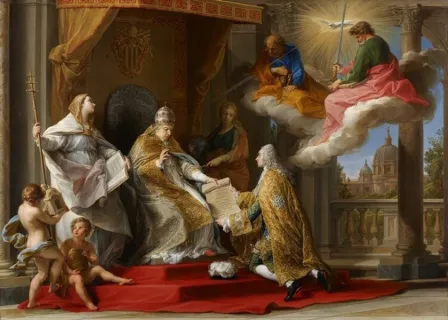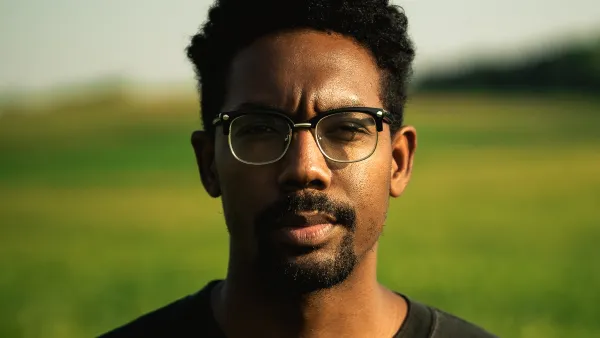Nick Dolan is a second-year PhD student in English and American literature. He has a broad interest in the engagements of religious thought, including Catholic thought, and poetry in English.

The Catholic Enlightenment in Europe, the Americas and Australia (1700– 1840)
Friday, September 20: Saint Louis University
Saturday, September 21: Washington University in St. Louis
Registration is free and open to the public. Please register here. Registrants are welcome to attend all or a portion of the conference.
One common way of thinking about the historical phenomenon of “the Enlightenment” is as a by-definition secularizing force. Under its sign, Immanuel Kant imperatively dared us all to know, and Thomas Jefferson applied a literal razor blade to the New Testament (excising its miracles to create his own “Jefferson Bible,” newly free of “superstition”). Voltaire, the leading French philosophe, famously undertook the copious manufacture of naughty remarks about the priesthood, roasting the Immaculate between sips of immaculately roasted salon coffee.
The bête noire of the Enlightenment, so the story goes, was the Catholic Church. The Enlightenment’s premium on individual autonomy and the free exercise of reason is taken to have been profoundly incompatible with the Catholic faith, which gets typecast as antiquated and atavistic. This polemical sensibility was most famously codified by Edward Gibbon, the Enlightenment’s own Grand Historian, in his multi-volume Decline and Fall of the Roman Empire. Gibbon blamed the rise of Christianity for the fall of Rome. What the aged body of that once-great empire “declined” itself into were not the vitalizing natural spas of Bath, England — built by the Romans at the outermost reaches of the empire — but the mystifying, physically and intellectually enfeebling waters of Christian baptism.
So, as I said, the story goes. The result of this narrative’s entrenchment in the popular mind means that “to a lot of people, whether they know it or not, the very idea of ‘Catholic Enlightenment’ is an oxymoron.” That’s according to Mary Dunn, director of the Center for Research on Global Catholicism (CRGC) at Saint Louis University (SLU). “In much of popular culture, literature and the stories we tell about the past,” Dunn elaborates, “Catholicism is a proxy for premodernity, for faith, for blind obedience to dogma.”
Dunn would know, not only as a scholar of Catholicism but as one of the co-organizers of an upcoming conference on — you, through your free exercise of reason, guessed it — the Catholic Enlightenment. The conference, which will be held September 20–21 on the campuses of SLU and Washington University in St. Louis, is co-organized by Dunn and Rebecca Messbarger, professor of Italian at WashU. (Over the summer, I have been providing logistical assistance to Professor Messbarger in preparation for the conference.)
The full title of the conference is “The Catholic Enlightenment in Europe, the Americas and Australia (1700-1840): Balancing Loyalties Between State, Nationality, Citizenship and the Global Church.” The conference is co-sponsored by its two host universities (including the CRGC at SLU) as well as the University of Münster in Germany, with financial support from WashU’s Center for the Humanities. At “a macro level,” Dunn wrote to me, “this conference will go some way toward disabusing the public (if they attend and we hope some do!) of this idea that Catholicism is regressive and retrograde” — more particularly, of the received notion that Catholicism and Enlightenment thought were always and everywhere antagonists.
In place of this too-pat view, the conference description sets out that “The Enlightenment, it has now been established, was as much a religious phenomenon as it was a secular one. This conference brings together leading scholars from around the world to interrogate the ways in which Catholics, in particular, interpreted and extended Enlightenment ideas to rethink and reform society, politics, the economy, education, science and the arts on a global scale.”
To facilitate a properly global exploration of this topic, Messbarger and Dunn have invited to St. Louis around two dozen scholars from around the world, including participants from Italy, Germany and Australia, and around the United States. In addition to organizing and leading the WashU half of the conference, Messbarger will also present her own research, which affords an (as it were) illuminating representation of the conference description in practice.
On September 20, Messbarger will present, in her words, on “the genealogy and filiation of the two principal reformist ideologies in the Italian 18th century.” The first of these is the Catholic Enlightenment as “manifest in the religious, cultural and civic reforms instituted by Pope Benedict XIV in the first half of the century.” The second is the “explicitly secular movement epitomized by” the playfully designated “Academy of the Fists” (L’Accademia dei pugni) — the name not of a lost Hong Kong martial arts film but a circle of brash Milanese intellectuals in the century’s second half, led by the criminology pioneer Cesare Beccaria. Messbarger writes to me: “Notwithstanding the manifest divergence of these two currents of Illuminismo, through their juxtaposition, I aim to show the fundamental points of contact and overlap, specifically at the site of the human body, which was for both the principal matter, means and measure of reasonable and just reform.”
Professors Shaun Blanchard and Jürgen Overhoff, who will respectively deliver opening remarks and moderate a concluding roundtable, also kindly answered my questions about their work. Blanchard, on faculty at the University of Notre Dame Australia (UNDA), will explore answers to “the basic question that vexed English-speaking Catholics from the days of Henry VIII and Queen Elizabeth all the way to Al Smith and JFK in the 20th century: How do you be a good citizen (loyal to the state) and a good Catholic (loyal to a global church headed by the pope) at the same time?” It seems to me that the present conjuncture, in which both the authority and the efficacy of nation-states are being tested by the climate crisis and contested by intellectuals and the public, is a good time to consider the past negotiations of statehood and the historically potent transnational institution of the Church.
While Blanchard will fly in from Australia, Jürgen Overhoff of the University of Münster will be presenting on part of Australian history: namely, “the thousands of Catholic Irish convicts that were transported to Australia between 1788 to 1810.” Overhoff will “highlight the fact that many of the Irish men and women arriving in Australia around 1800 were brought up in Europe in a context where the ideals of the Enlightenment mattered. They form part of what can be labeled a specifically Irish Catholic Enlightenment.” Overhoff will be joined in Australian considerations by Annemarie McLaren, also of UNDA, who will present on “Catholic Baptism and Aboriginal People in Early Colonial New South Wales.”
Note, at the end of this article, Overhoff’s shift in grammatical article: from definite to indefinite, from invocation of “the” Enlightenment to discussion of “a[n]” Enlightenment among others. This switch is one index of where the Catholic Enlightenment, as an object of study, might take you: out from the signature coffeehouses frequented by the period’s intellectually great women and men (important though these figures are), and — following the model of a personage who I have reason to believe is well-regarded by Catholics — into the desert. The desert, not of Roman Palestine, but of the Outback. History is always more variegated than any just-so story can capture.
If an eccentric historian of the senses, driven mad by the humanities job market, were to assign to each historical paradigm a telltale aroma, the Catholic Enlightenment’s might then be this: the upward waft of a takeaway coffee cup held in a lap at Mass, mingled with the purl of incense.



